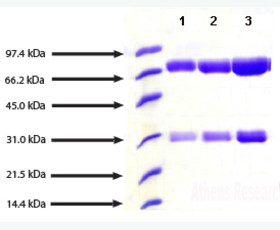Recombinant Human Interferon α-4/IFNA4
| Product name: | Recombinant Human Interferon α-4/IFNA4 |
| Source: | Human Cells |
| Purity: | Greater than 95% as determined by reducing SDS-PAGE. |
| Buffer Formulation: | Lyophilized from a 0.2 μm filtered solution of 20mM PB,150mM NaCl,pH7.2. |
| Applications: | Applications:SDS-PAGE; WB; ELISA; IP. |
| Storage: | Avoid repeated freeze/thaw cycles. Store at 2-8 oC for one month. Aliquot and store at -80 oC for 12 months. |
| UOM: | 100ug/50ug/200ug/1mg/1g |
| Source | Human Cells |
| Description | Recombinant Human Interferon alpha-4 is produced by our Mammalian expression system and the target gene encoding Cys24-Asp189 is expressed with a 6His tag at the C-terminus. |
| Names | Interferon alpha-4, Interferon alpha-4B, Interferon alpha-76,Interferon alpha-M1,IFNA4 |
| Accession # | P05014 |
| Formulation | Lyophilized from a 0.2 μm filtered solution of 20mM PB,150mM NaCl,pH7.2. |
| Shipping |
The product is shipped at ambient temperature. |
| Reconstitution |
Always centrifuge tubes before opening. Do not mix by vortex or pipetting. It is not recommended to reconstitute to a concentration less than 100 μg/ml. Dissolve the lyophilized protein in ddH2O. Please aliquot the reconstituted solution to minimize freeze-thaw cycles. |
| Storage |
Lyophilized protein should be stored at < -20°C, though stable at room temperature for 3 weeks. Reconstituted protein solution can be stored at 4-7°C for 2-7 days. Aliquots of reconstituted samples are stable at < -20°C for 3 months. |
| Purity |
Greater than 95% as determined by reducing SDS-PAGE. |
| Endotoxin | Less than 0.1 ng/µg (1 IEU/µg) as determined by LAL test. |
| Amino Acid Sequence |
CDLPQTHSLGNRRALILLAQMGRISHFSCLKDRHDFGFPEEEFDGHQFQKTQAISVLHEMIQQTF NLFSTEDSSAAWEQSLLEKFSTELYQQLNDLEACVIQEVGVEETPLMNEDSILAVRKYFQRITLY LTEKKYSPCAWEVVRAEIMRSLSFSTNLQKRLRRKDVDHHHHHH
|
| Background | Interferon stimulates the production of two enzymes: a protein kinase and an oligoadenylate synthetase. They allow for communication between cells to trigger the protective defenses of the immune system that eradicate pathogens or tumors. They are typically divided among three IFN classes: Type I, Type II and Type III. IFNA4 is a secreted protein and produced by macrophages. Two variants of IFNA4 (IFNA4a and IFNA4b) are known, which differ from each other by changes in their coding regions at nucleotide positions 220 and 410 . |














